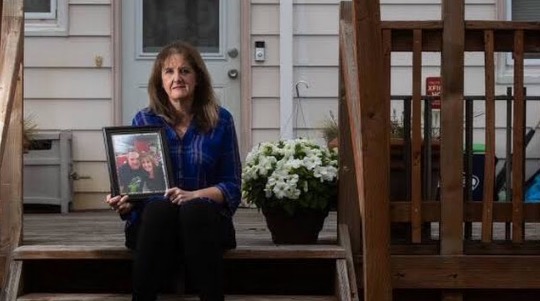Tacoma nurse brought COVID-19 home. Now her husband is on a ventilator, fighting for his life

Tammy Edwards remembers closing her front door and falling to her knees.
Moments earlier, the nurse at Tacoma General Hospital had watched her husband of nearly 10 years, Brian Edwards, strapped to an oxygen tank and taken away in an ambulance.
She knew he was stricken with COVID-19, because she had brought it home from work.

She knew, because of her medical training and the overwhelming signs, he was struggling — most notably an inability to breath and dangerously low oxygen levels.
Local news has never been more important
Subscribe for unlimited digital access to the news that matters to your community.
And, amid the coronavirus precautions and limits on visitation, she knew precisely what a trip to the hospital under such circumstances could mean — that the kiss on the cheek she’d given Brian moments earlier might be the couple’s last.
Three hours later, Edwards said, her husband had been intubated — sedated and placed on a ventilator that has been helping him breath ever since.
“I said, ‘I love you. You know I can’t be with you,’” Edwards recounted Monday, eight days after Brian, 50, was rushed to the hospital where she works.
“I remember closing my door, and I just lost it. I just had a meltdown,” Edwards, 51, continued. “I didn’t know if I was ever going to see him again. It was really hard. I paced around in my house for a couple hours, crying and praying.”
That night, Edwards also took to social media, posting photos and an update on Brian’s condition to Facebook. The couple grew up in Tacoma — both graduating from Wilson High School — and have a large circle of friends and relatives. She wanted people to know how he was doing.
As a nurse, Edwards said she also wanted people to take COVID-19 seriously. Brian had no underlying health conditions, she explained, and yet he was still fighting for his life.
“I decided, you know what, there’s so much going on in the news right now — so much controversy — that I wanted to reach out to our community and show this is real,” Edwards said of the Facebook post, which has now been shared thousands of times and garnered widespread attention.
“This is not a hoax, and it’s not a conspiracy,” she added. ”This is the real deal.”
Since her husband was admitted to Tacoma General, the emotions have been overwhelming and come in waves, Edwards said.
She’s often terrified and unable to sleep for fear of missing a call from the hospital. Her husband is now in stable but critical condition, but the illness is unpredictable, and he’s “very sick and has a long road ahead of him,” Edwards said.
Edwards also longs to hear her husband’s voice again — to connect with him, even from afar. Right now, her contact with him has been limited to nightly, one-way video chats. Edwards talks to Brian for hours every evening, she explained, confident he can hear her through a phone placed next to his ear, while she watches for small signs to confirm it.
“I just talk to him until his phone dies,” Edwards said.
Then there’s the guilt — which might be the hardest part of all and underscores the incredible sacrifices being made by medical professionals during the coronavirus pandemic.
The registered nurse, who works on Tacoma General’s birthing and postpartum unit, said she became ill earlier this month and tested positive for COVID-19 on April 10. Previously, Edwards was notified of exposure on her unit, she explained.
Brian, meanwhile, developed symptoms the day before her test results came back.
Today, Edwards is still recovering, and has yet to return to work.
The toll COVID-19 has taken on her husband is much greater, she said.
“When he first went in (to the hospital), I figured that he was likely not going to make it. That was awful,” Edwards said, recounting Brian’s persistently worsening cough, gasps for air and exhaustion-induced delirium.
“When he left that day, on Sunday, I buckled and I had to sit down. All I thought about is, ‘This is your fault. It’s your fault,’” Edwards said. “I’m devastated by it. I’m heartbroken. I know I likely caused this, even though we were taking precautions.”
The “only thing that really keeps me strong,” Edwards said, is how Brian supported her career, even after he became ill with COVID-19.
That doesn’t stop Edwards from apologizing to him every night over the phone, she said.
“He knows I’m a nurse, and we know the risk. We talked about it, and he’s not upset with me. But I still tell him I’m sorry,” Edwards said.
”I apologize to him, because I brought it home and he got sick. I have a lot of guilt about that.”
Read more here: https://www.thenewstribune.com/news/local/news-columns-blogs/matt-driscoll/article242275096.html#storylink=cpy

